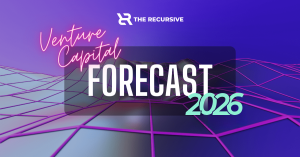Does Central Europe have the potential to become Europe’s driving motor for deep tech innovation? What are its competitive advantages and opportunities?
Poland based VC Fund OTB Ventures bets on this prospect with its recent €150M “Fund 2” with investment from InvestEU. OTB Ventures is a leading capital firm in the CEE region investing in early growth, post-product, deep tech startups. Their current portfolio includes companies like SettleMint and Hydrosat, with successful exits with Minit and BabbleLabs.
We met with Adam Niewinski, Co-Founder and General Partner of OTB Ventures and discussed his views on the region, OTB’s plans with their new fund and what they look for when investing in a startup. Adam has over 20 years of experience as an entrepreneur and senior executive and has been an angel investor for over a decade
The Recursive: On the recent news of your recently announced “Fund 2”, what is your number one priority for it and which sectors do you see as strategic?
Adam Niewinski: Frankly speaking, we want to do more of the same within those four sectors that we are particularly keen on: Space Tech, AI automation, FinTech infrastructure, and Cybersecurity. We actually would like to do more within Climate Tech but within those four sectors.
So rather than saying that, suddenly, we are trying to present ourselves as climate experts, we want to look at these sectors for opportunities in that area. For example, a Space Tech company that can provide satellite imagery on deforestation or droughts, or a company that uses technology to improve the yield of crops.
“Good tech, sustainable tech, needs also to be good business. So we are trying to see great businesses as the ones being great for the climate and the Earth.”
Another thing I would say we are changing a bit is that we are also opening up more for investments outside the CEE. We believe that we have very strong capabilities, especially in Space Tech and AI automation. And all those businesses are global, whether the company is from Luxembourg, Finland, or the Czech Republic.
However, it’s not like we are leaving the CEE. On the contrary, being a company from the CEE region, we are getting a lot of value from there. It’s really about investing where you see great deals and see great opportunities. For us, the CEE remains our core market.
Last, we want to do some more seed deals. In “Fund 1”, we had a very serious Series A focus – post product, post revenue, nice revenue traction. In “Fund 2”, we allow ourselves to pursue a limited number of opportunities a bit earlier. Of course, we need to be sure that this is super exciting technology and very experienced teams to consider investing.
What are the specifics you pay attention to in the deep tech sector?
It’s good to start on how we understand deep tech or real tech if you will. For us, this is disruptive tech with unique IP, companies that have developed breakthrough technologies, with diverse, strong technical teams and advanced products.
This can be found in multiple areas, like Space Tech or AI automation. We do see a lot of real tech in FinTech infrastructure, not focusing on B2C solutions, but for example blockchain or payments. And finally, cyber security. This is the fourth area that we are particularly keen on investing in. So, it doesn’t have to be quantum computing. And, actually, we much rather prefer such real tech, which has a visible path to revenues, or preferably an already early stage of growing revenues. So, it’s less about scientific inventions or about advanced R&D, we leave that for the universities. But more of something really disruptive technologically. More than, for example, a cool app for electric bikes.
Changing the topic to the region you mostly operate in, would you share your perspective on CEE and its potential as a deep tech hub? What competitive advantages and opportunities do you see?
We definitely believe that the region is populated with very talented people with a far above-average share of very technically talented people. This is the actual strength of the region.
For example, when you think of Art, you might think of Italy where you can enter any given city, look around the buildings and everything is beautiful. In the CEE, due to historical and educational reasons, it’s the technical skills – just look at how overrepresented the region is when it comes to great mathematicians, physicists, and chess players.
What we typically miss are commercial skills. To add, or perhaps extend, I would add self-confidence on a global scale. You could take as an example the country of Israel, where they have this ability to do “impossible” things and present them in a perfect way.
In the region, we find that people have a hard time presenting themselves and their skills up to their true capabilities.
Understanding that the negotiations for “Fund 2” have been going for a while, how did the current economic scenario impact those negotiations?
I would start with the fact that in “Fund 1”, we’ve managed to already return half of the investments for our investors, the so-called DPIs over 0.5%. We did two exits, one last year with Bubble Labs to Cisco, and this year, we exited Minit with Microsoft, both quite successful deals with triple-digit IRR.
Returning the investments from “Fund 1” to our investors helps a lot in fundraising for another. And of course, if you look at our portfolio, the companies we believe are going to be our fund returners are still there. I would say our “Fund 1” looks quite optimistic.
Thanks to that and the trust we’ve been building with our current investors, I would say the majority of our current investors actually increased their exposure and doubled down on us.
The second part is we are able to gain new, reputable investors. We are delighted that experienced investors like Tomasz Domogala (from TDJ Holdings) and Marcin Zukowski (Co-Founder of Snowflake) decided to invest in OTB Ventures.
The trust of our investors in “Fund 1” helped us to have a smooth process in building “Fund 2”.
You mentioned that you’re very focused on the people who are part of the company. What do you look for in people when investing in a company?
VC is a people’s business above all so, first, you need to build a good relationship with the founders of the companies that you invest in. Typically, it’s a long-term relationship that can last up to 10 years, so it’s better that you understand each other well. But it’s also about the interaction with other investors, and co-investors With your LP.
If there’s one thing that I would stress in particular that I really love, is for the founder (or founders) to have a very strong point of view and also to be able to very quickly change it.
What I would be looking for would be a founder with a strong established vision, which is built on experience and a good understanding of the sector of the industry he or she is operating. Also, it’s tremendously important for him or her to be willing and able to listen to other people. And when I say listening to people, I mean listening with understanding and digesting the information and coming up with their perspective on ideas, but not neglecting what he or she has heard.
It’s not that obvious that a great idea is great from the start to the end. Sometimes you need to change something, you need to pivot. The economy is constantly changing, the environment is changing, and the competition is changing, so either someone is willing and able to adopt all this, or it’s gonna be tough.
Given the forecast of an upcoming recession next year, did you consider any pivot or change in direction to cope with the situation?
No, not that much, we’ve never been actually too focused on NFTs for example, we were also not crazy excited about crypto or Web3. Ideas that had their great moments but the reality check doesn’t look as good as many would’ve thought.
Basically, sticking to what we’re doing and staying on course with a focus on real tech. I believe the way to go and the way that helped us go through the cycles. Not getting overexcited and not getting too depressed. We keep investing, obviously looking more these days at the capability of the company to reach breakeven. This is less about how fast it can grow but about the ability to understand when and how it will breakeven.
From the macro perspective, what do you see as the next step for OTB Ventures?
We are definitely strengthening the team so we’ll be adding more people to OTB to cover both geographic areas and verticals even better. We see deep tech as a concept dynamically growing in Europe, with the CEE blooming.
We see more and more great companies appearing in surprising cities and I personally love it. Now, any city with a University or Polytechnic is a place where you can find the next big company.
I think that there is a lot to be done in the area that we’re focusing on. I don’t expect we won’t have enough work to be done.







